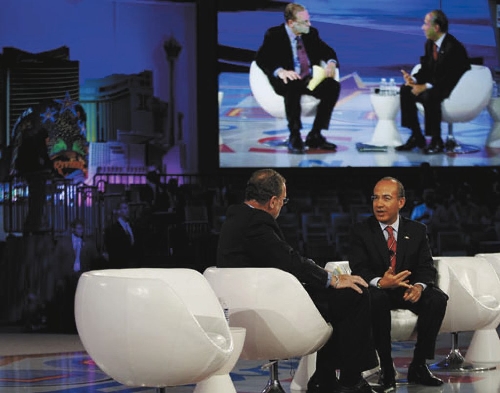Visit Mexico and get cheaper health care, Calderón suggests
While trying to convince travel industry executives that tourists to Mexico should not fear being caught in a narco war, Mexican President Felipe Calderón dropped a startling proposal for reining in the costs of U.S. health care.
"I know this country has severe financial problems related to Medicare," Calderón told the audience Thursday on the final day of the Global Travel & Tourism Summit at Aria. "So it is possible to reduce the expenditure of Medicare if the (U.S.) government will allow the American people to receive medical services in Mexico. It's a win-win situation. Very good service, quality service and it would be cheaper for people and cheaper for the government."
He said that in the first four years of his term, which ends in November 2012, his government had constructed about 1,000 new clinics and hospitals and renovated 2,000 others. Some time next year, he added, all Mexican citizens would be covered by some form of government health plan.
This still leaves room for Americans willing to go south for lower-cost care, a practice often called medical tourism. For example, in Algodones, just across the border from Yuma, Ariz., a colony of dentists has formed to handle American clients.
When it comes to regular tourism, Mexico faces the problem of regular publicity about shootouts between government forces and drug gangs, leading to U.S. State Department warnings to avoid the country. For instance, people who went to the Sun Bowl in El Paso, Texas, in December were advised not to go to neighboring Juárez, Mexico, a favorite day trip in past years.
Calderón contended the danger is limited mainly to border areas, while much of his country has been safe.
"You can count on your fingers the (violent) cases related to international tourists," he said. "Actually, the rate of those affected was about zero, or 0.0001 percent."
The homicide rate for all of Mexico was lower than the rate in Washington, D.C., Pittsburgh, Atlanta or New Orleans, he added. And this past spring break, when college students headed to Cancún and nearby areas despite warnings by the Texas Department of Safety, went off without problems.
"I saw thousands of spring breakers having fun in Mexico," Calderón said. "The only shots they received were tequila shots."
The appearance at the summit was part of what was described by Mexican officials as a one-day working visit to Las Vegas, including a visit with Sylvester Stallone and other directors of Planet Hollywood International, to promote more movie-making in Mexico.
In another travel summit event, Homeland Security Secretary Janet Napolitano addressed continuing complaints about intrusive airport security screening. She said her goal is to move airport security to a "risk-based approach," instead of treating everyone the same.
Risk assessment would identify passengers who pose no terrorist danger and let them pass through airport security without removing shoes, being subjected to full-body scans or patdowns.
Citizens of three countries -- Mexico, Canada and the Netherlands -- can enroll in the Global Entry program, in which people submit to background checks in return for light screening. Processing time at the airport for these people takes less than a minute, Napolitano said.
The program will soon have 1 million enrollees, on track to double in the next year. Still, that amounts to less than 1 percent of the 720.4 million people who flew in the U.S. last year.
Contact reporter Tim O'Reiley at toreiley@reviewjournal.com or 702-387-5290.




























